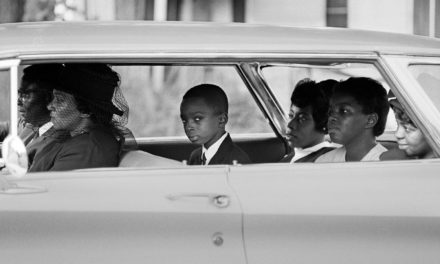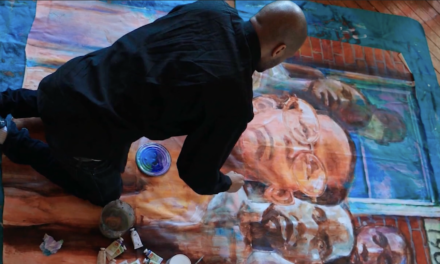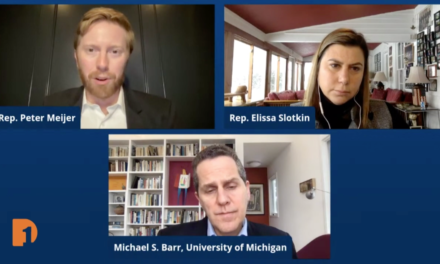Vaccine supply in Michigan has increased, but vaccinations are slowing in Michigan, with state data showing a nearly 30% decline in the vaccination rates from the last 2 weeks. In Detroit, vaccination rates are at about 25%, lower than the state average.
Christy McDonald talks with Lt. Governor Garlin Gilchrist about the challenges of vaccine access, addressing vaccination hesitation in the city of Detroit, and answering the question of why the Governor’s office hasn’t made the decision to enact another shutdown. Check out the full interview here.
Read full transcript
Christy McDonald Well, let’s go ahead and get started, let’s get started here. You just received your second dose of vaccination. What was the process like for you?
Garlin Gilchrist, Michigan Lieutenant Governor Well, so thanks for having me on to talk about this, Christy, because it’s really, really important that everyone makes the choice to get vaccinated. I got my first dose of vaccine this past weekend, and now that it’s open to everyone who is 16 years or older, it finally reached me. And so I was glad to, frankly, join the, now, you know, more than 6 million people in Michigan who’ve gotten the vaccine dose. And so, this has been something that’s been really important to me. My wife as an education worker has been fully vaccinated for a few months now. And I think this is the choice that everyone needs to make. So, I got an appointment, I went to a community site in the city of Detroit. And this is really about showing that there are so many different ways to get a vaccine, whether it’s you go to a pharmacy, you go to a community site, like I went to a church. There have been schools that have had vaccine clinics open, I’ve toured one at Central Michigan University. So college campuses, everyone’s really stepping up to do their part because we really need to make sure that as many people as possible in Michigan have access to the vaccine. That’s why the Governor and I are working every day to get more vaccine and in state.
Christy McDonald All right, let’s go ahead and take a look at the numbers, because we know we have some disparities, especially when it comes to the city of Detroit. I think some of the latest numbers said about 26 percent of the population of the city, ages 16 and up, have had at least one dose of a vaccine. And that’s compared to the rest of the state, which is about 44 percent. Do you think it is hesitancy that we’re seeing the difference in these numbers or is it access at this point?
Garlin Gilchrist, Michigan Lieutenant Governor Well, we have a lot of work to do, first of all, let me say that. And the truth is we need to address both of these challenges. The fact that people have had questions or issues with vaccines in general or with the COVID-19 vaccine specifically. That’s why we established to Protect Michigan Commission, which I chair, to try to get all that information and those resources out in a credible way, and we still are going to continue to invest in that work as a state. And then with access, I think city leaders, I think leaders across, they are doing everything they can to break down those barriers to access and we still have work to do there as well. So, that’s one reason why I went to a community site, because I wanted to demonstrate that this was a place that was pretty accessible, a neighborhood anchor, frankly, the people are used to going to. And I was proud to see, frankly, a church full of black folks getting vaccinated on Saturday. And I think that’s the kind of thing that we’re going to need to continue to press access on, to make sure that Detroiters can get vaccinated and that Michiganders can get vaccinated.
Christy McDonald Because I’m still hearing stories that it’s complicated for a lot of people. Either they’re getting online, or they have to try multiple times, or they have to go to different sites at different times, and that it is not that easy of a process. What are some of the people telling you, like when you are at the community site, at a church about what people’s experiences have been and then what they’re telling other people? Because, again, spreading things by word of mouth or saying, “Look, this was my story, it wasn’t so bad and this is how I can help you.”
Garlin Gilchrist, Michigan Lieutenant Governor One of the things that’s been important is, again, is vaccine supply has increased, we’ve been able to increase the availability of walk in appointments at places. Because, you’re right, some people have had challenges navigating online systems or even text message based systems. Being able to walk in and get a vaccine dose is really the most optimal format for that for a lot of people. And seeing that coming online in cities like Detroit and other cities across the state, again, I think is an important step forward in making sure that we are making the vaccine as accessible as possible. So I think this is just part of the evolution of the vaccine rollout process and we’re going to continue to add more tools. Michigan was a leader and innovator, frankly, in mobile testing, in mobile testing in the pandemic. And we’ve shifted that infrastructure now to provide mobile vaccine units to communities across the state of Michigan, particularly in southeast Michigan, where we have vans full of vaccines driving to places in communities. Where they’re driving to a sports field, driving to a recreation center, driving to a church, and also being able to vaccinate people that way. So that kind of flexibility is going to be really critical, us making sure that vaccine can meet people where they are.
Christy McDonald Are you talking to Mike Duggan at all about it?, Is he’s saying, Look, we need more help from the state? Or is he saying, look, we’ve got enough that we need? Or what are some of the conversations that are happening between the Mayor and the Governor’s office?
Garlin Gilchrist, Michigan Lieutenant Governor So, we’re in communication with the Mayor’s office as well as with the mutual leaders across the state on pretty much a daily basis. I mean, they know, we’re working together to make sure people can get what they need. And so, the city of Detroit certainly, they’ve been pretty aggressive in terms of, again, the types of availability that’s been made possible for Detroit is. Where it’s walk in clinics, mobile sites, churches. There were there were sites at high schools in the past week or so. And so I think they’re just going to make sure that they have all the tools that they need and we’re going to make sure that we get them.
Christy McDonald How important is it, I guess, to see example, to have community leaders come out and share their stories of vaccination and help people navigate that?
Garlin Gilchrist, Michigan Lieutenant Governor I think that this is one of the most important things. What I’ve been hearing since the vaccines became available back in December, is that people wanted to see not only people who look like them, but people who they know get vaccinated. And so as we ramp up the number of people who are getting vaccines and from communities across the state, I think it’s going to help because people see someone they know and they love and they trust who has made this choice and who is doing OK. So, you know, I got my vaccine; my arm was a little sore for the rest of that evening, but I’m good. And as a young, you know, 38-year-old black man who was relatively healthy, I thought it was important to do that publicly so that other people who are my peers or also family members of my peers could see that and make that similar choice.
Christy McDonald This whole pandemic is about mitigating risk and seeing what we need to do to go out and about, what we need to do to protect ourselves, and what the risk may be. And, in taking the vaccine, we also have to balance the certain risks. When Johnson & Johnson came out and suspended the vaccine so they could look back into some of the incidences, some of the small incidences that have happened after people got vaccinated, how detrimental do you think that that news was to people who are already slightly hesitant about the COVID vaccine? Versus saying, this is actually the system that worked. If something’s happened, it was flagged so we can take a second look.
Garlin Gilchrist, Michigan Lieutenant Governor Sure. I do think that what happened with Johnson & Johnson vaccine is a demonstration about how closely and carefully the vaccine rollout is being monitored by national public health experts. By showing, hey, if there’s something that that raised a flag or question, the ability to take a step back and look at that more deeply is an important characteristic of this system actually functioning. As opposed to just letting things go with no sort of oversight and potentially having problems that we weren’t able to address. So, yes, that meant we had to retool some of our infrastructure that was dependent upon that one shot Johnson & Johnson vaccine. But nevertheless, I expect that the experts will come back, I know there is a meeting this coming Friday from the Food and Drug Administration and the CDC and others, where they will make a determination about what the protocols will be for the Johnson & Johnson vaccine going forward. And when that is approved and when it’s available, we will add that back to the list of safe and effective vaccines that are available to people in Michigan and all across the country.
Christy McDonald We’re talking about the importance of vaccinations, but people are saying Michigan has the highest rates of COVID now in the country. Why aren’t we shutting it down? Why aren’t we going back and saying, gosh, we’ve got to take a two week pause, we’re going to halt everything? Your administration has taken a lot of heat for not doing that in the past month.
Garlin Gilchrist, Michigan Lieutenant Governor You know, we’ve asked for people to pause a lot of activity. We’ve asked for people to not dine indoors. We’ve asked for indoor sports, for example, to take a pause. We’ve asked for people to quarantine after coming back if they’ve taken a vacation or a spring break trip. And so, we hope that people in Michigan will step up and do the right thing. The truth is, we’re in a different position than we were in 2020, the question is, why? Why are we in a different position right now? And unfortunately, it’s because of the politicization, frankly, of the pandemic and the response to the pandemic. We have many fewer tools available to us, because the republicans fought us tooth and nail and frankly took us to court to take away some of those tools that were available to us. And so we’re trying to work with what we have at our disposal and also ask people to look at the knowledge that we, and the experiences that we’ve had over the last year; we know what works. We know masking works. We know being careful and with indoor gathering’s works. And so if we do that, these are things that can help us, along with ramping up vaccines, to get through not only this increase in cases, but ultimately end the pandemic, which we can do on our terms. We have the capacity and the knowledge to do that. We just need every Michigander to step up and play their part.








